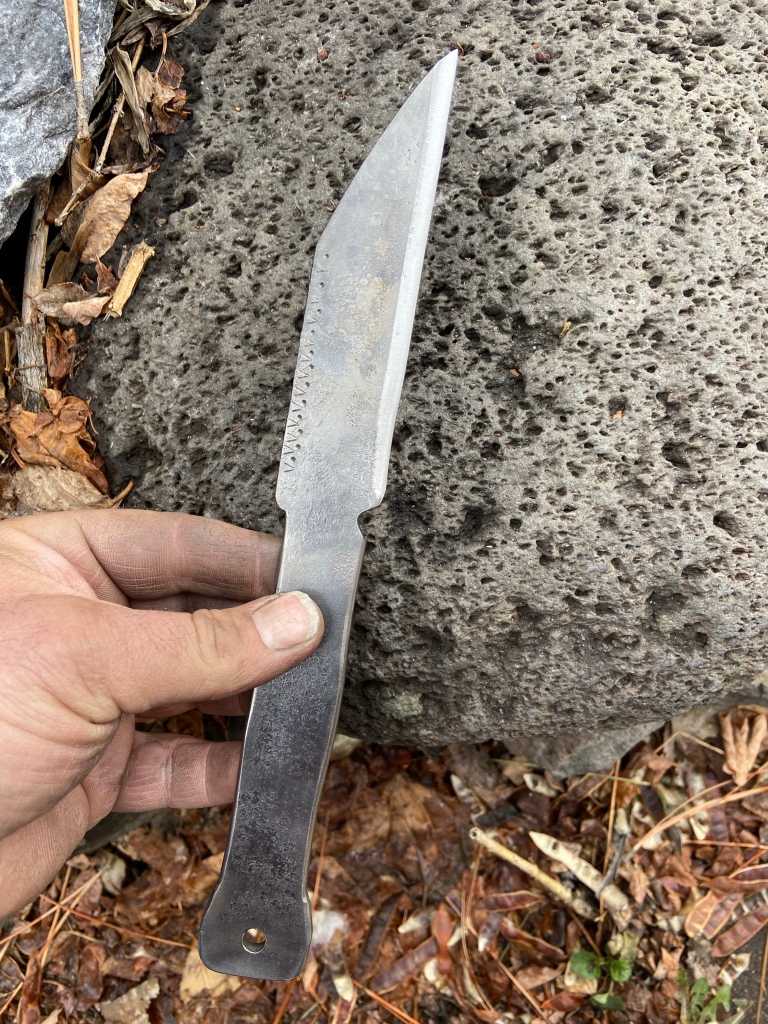Dithmarschen Mjönir
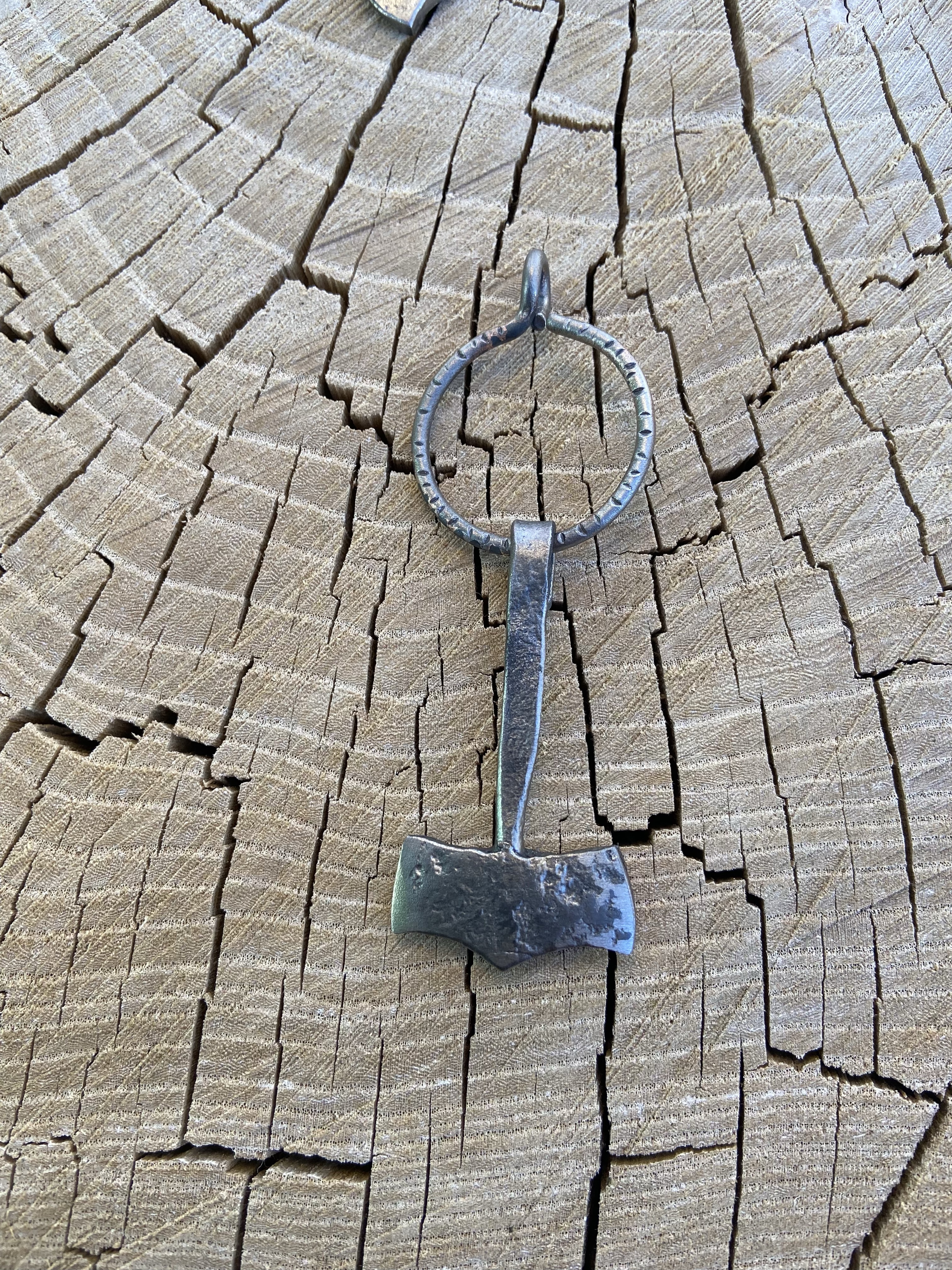
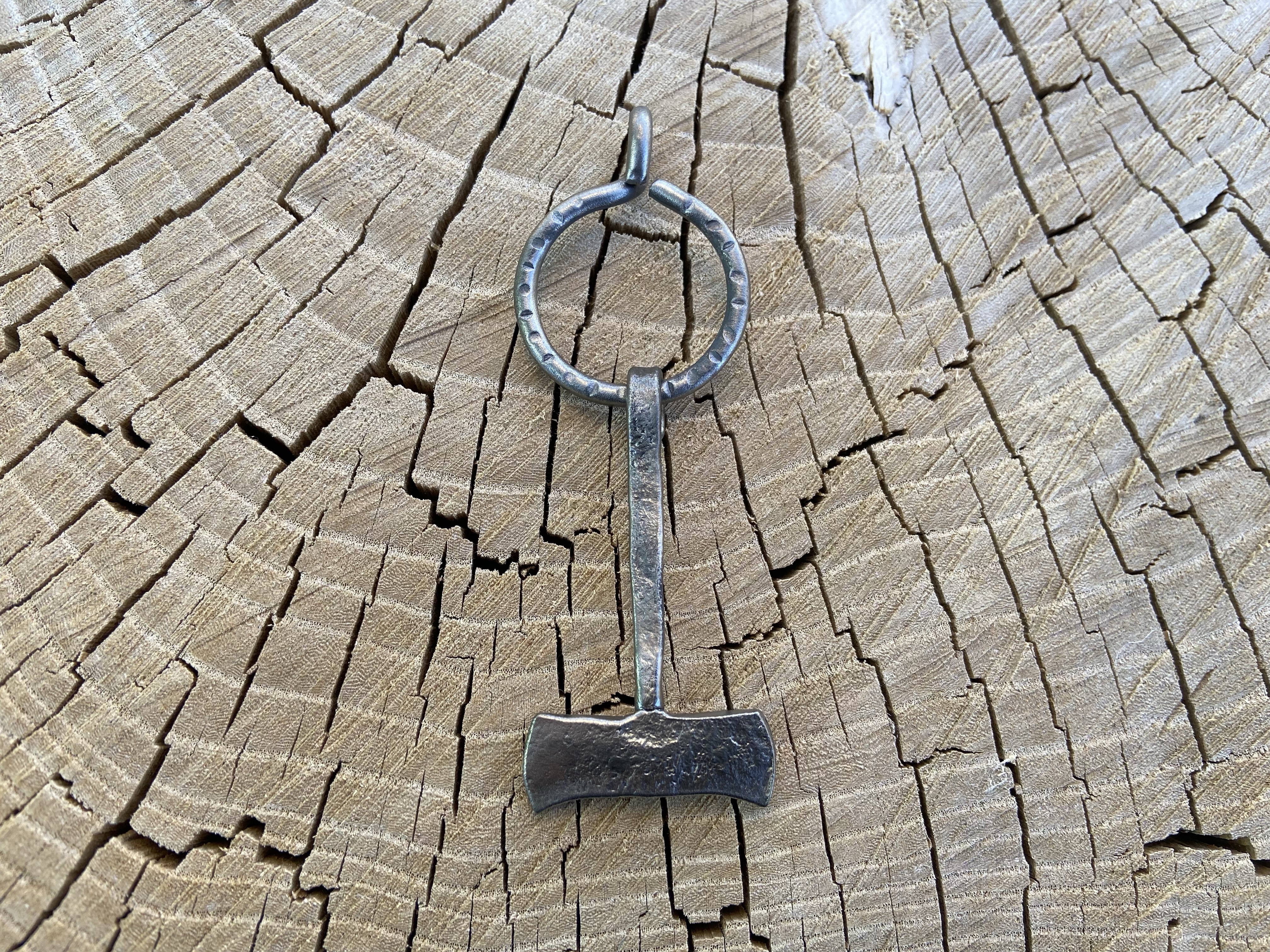
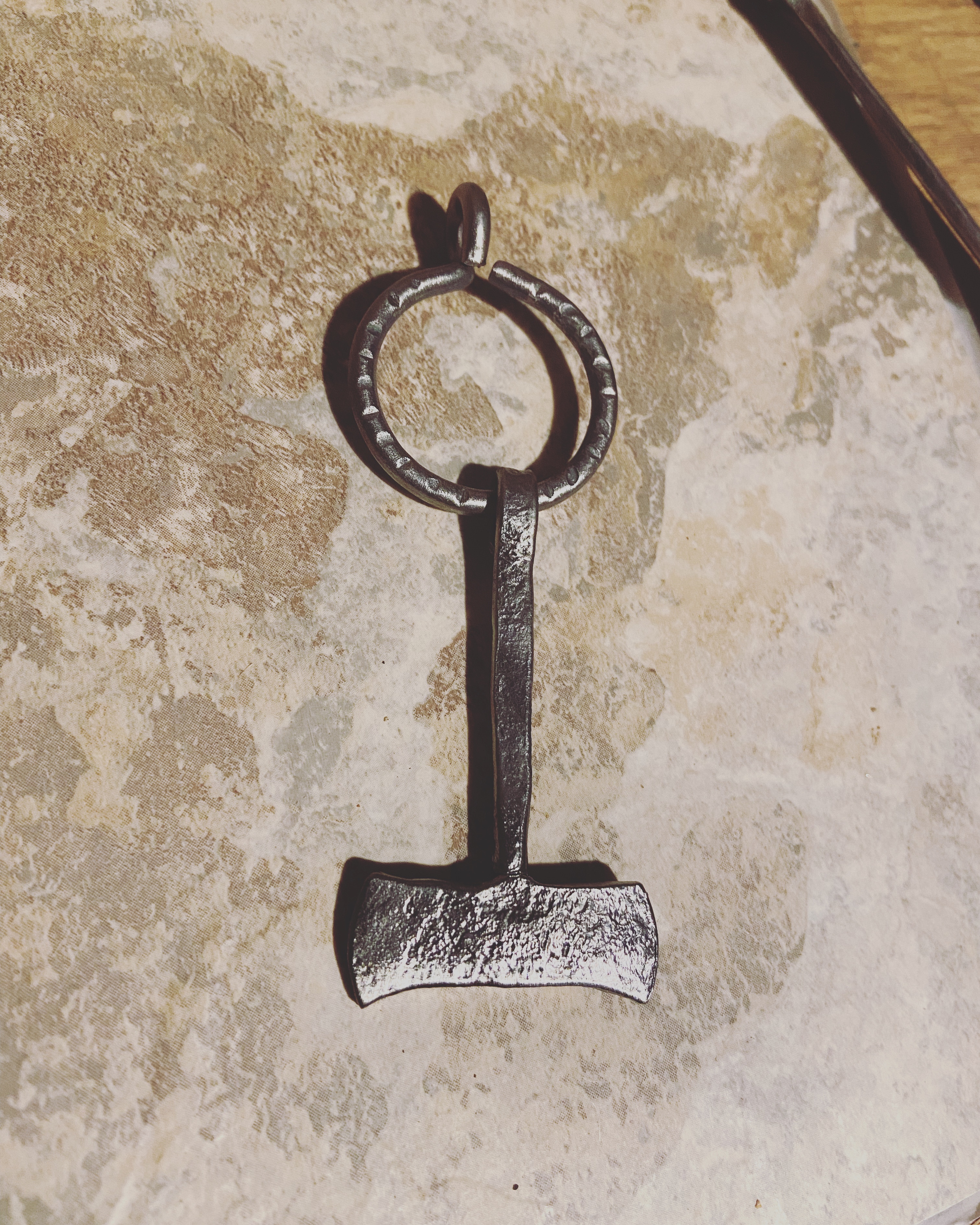
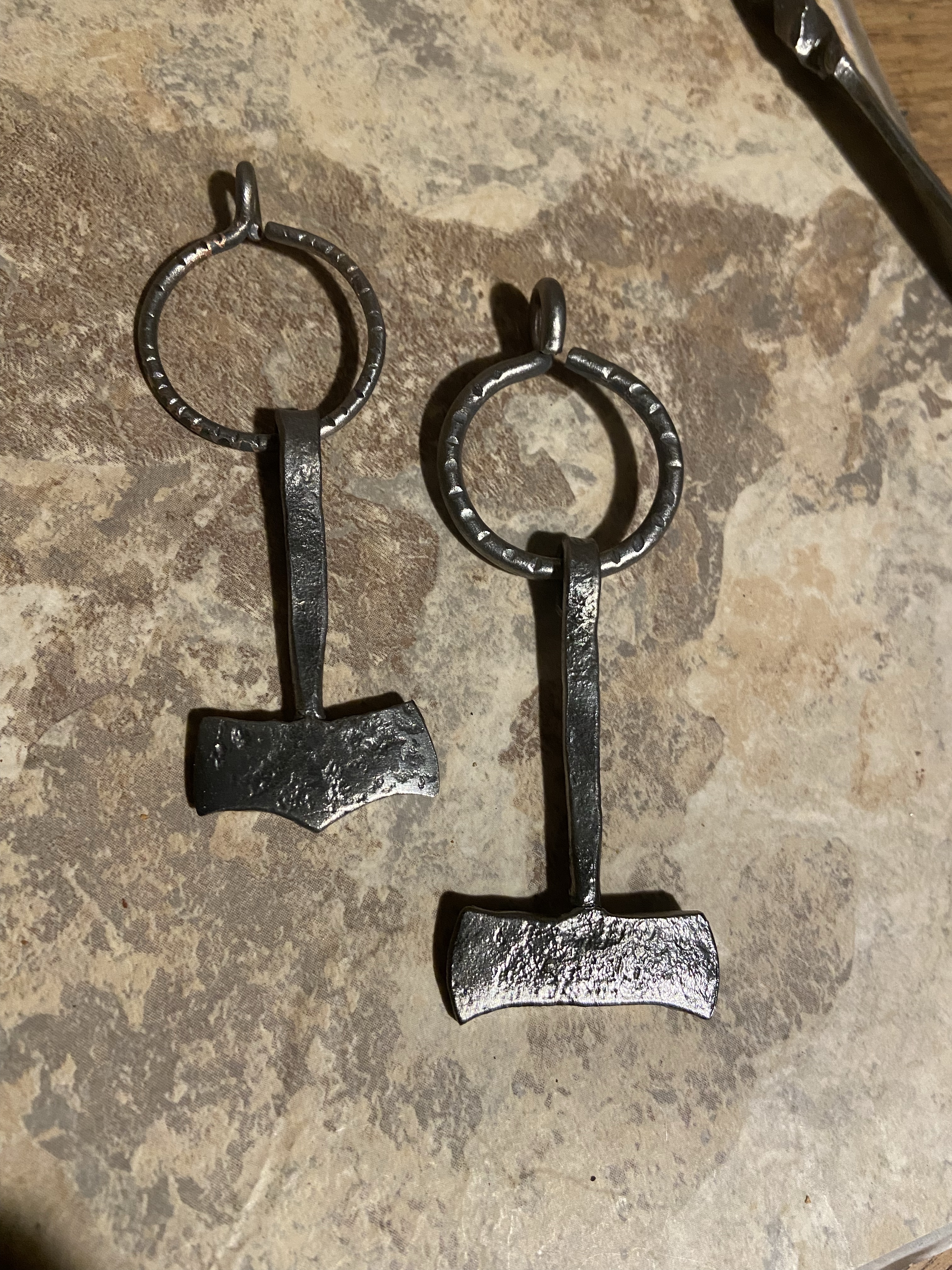
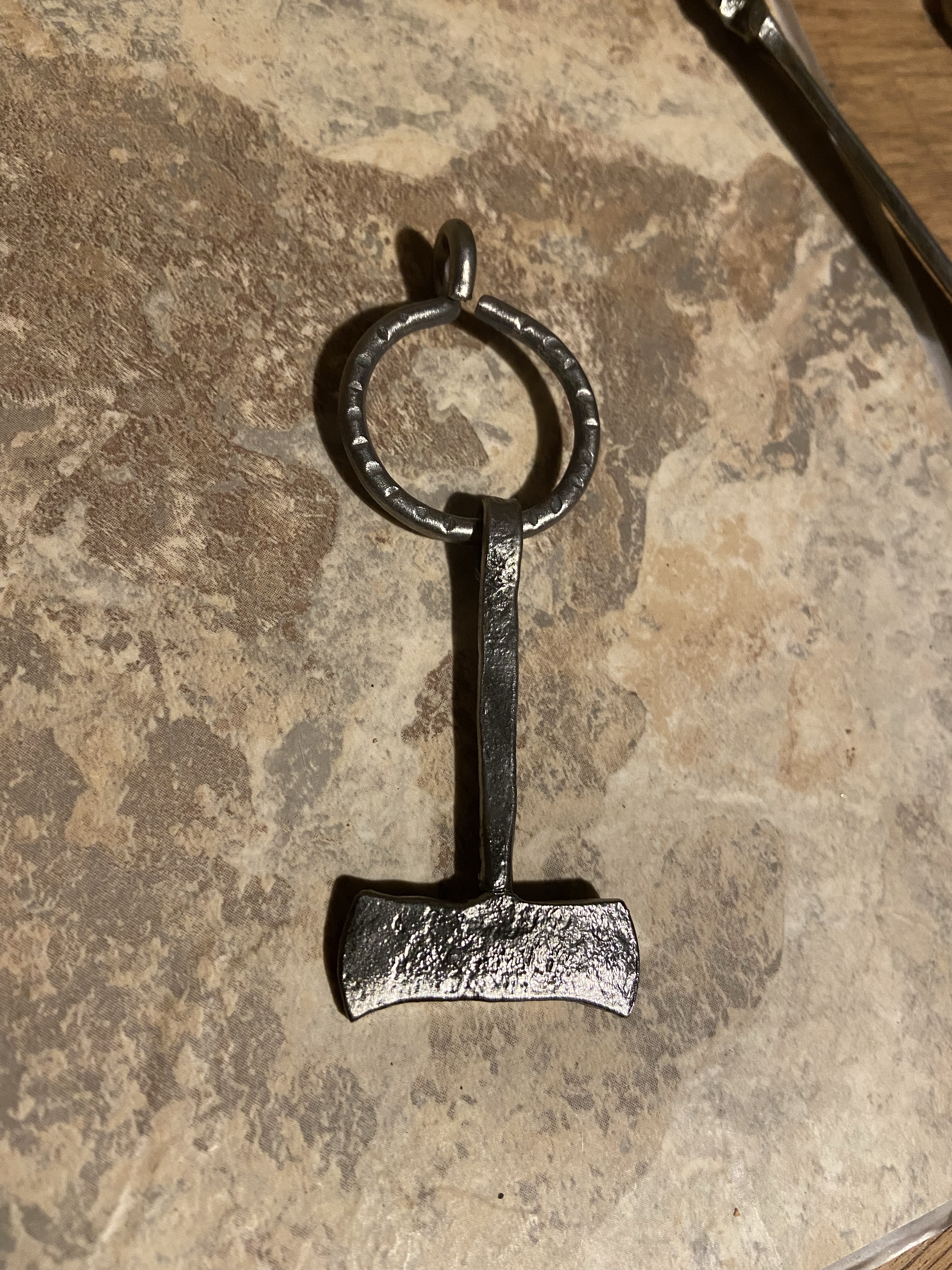
Hroð-
Etsy back up.
https://www.etsy.com/shop/NorseWest
After forever the forge is back in action. Trying to find a trip to Denmark/Germany. no customs just what is on here is available for now. Not back to knives yet. Hammer arm is a bit rusty yet.

Skål.
Hröð-
Anglo Saxon grammar ideas
Anglo Saxon grammatical ideas and dative in semi poetic use:
The AS language retains the archaic Indo-European function of cases and gender as well as complicated poetic grammar that uses cases to imply words that are not actually written. In modern Germanic language only German and Icelandic retain cases and gender in any heavy use. Swedish and Danish have Common and Neuter in modern use. Danish and Old English share sometimes a visually close vocabulary but many are false friends and mean something different. AS uses cases not word order to indicate grammar and is more free in word order. This does not mean it is totally free or random in word order.
(The genders are meaningless in function in AS and only serve as a complicated archaic hold over from Proto Germanic and act as another layer of things to memorize. My interpretation from “Robert E Diamond” Old English grammar/ reader).
The following is my own writing of what I have learned.
The dative:
“Hail to the Sun”
The sun is receiving the call so it is singular dative.
I am the one hailing so I am in nominative.
Hælu Þære Sunnan (hail the sun) “to” is implied when using the dative and technically so is “the” so you could write it “Hælu Sunnan” and “ to the” ís implied and would be understood as such. The ending “an” on the Goddess name Sunne denotes a weak declension of the feminine noun. “Þære” ís the feminine dative form of “the” the nominative (f) form of the is “Seo”. Male Form(n) “Se” which is close to PG and PIE sources.
To add a personal emphasis I could add “Ic”
“Ic Hælu Þære Sunnan”
“I hail the sun”
As you can see Ic is cognate to German Ich.
When using articles (words like “the”) the article must match the gender of the word and the articles case must match the case being used. Dative with dative etc…
Example: masculine:
Se (nom) Hund (nom)
“The Dog” the dog is the subject so it is nominative as is “the”
Se Hundas (Nom/Plural)
“The dogs” plural
Þæs Hundes bān (Genitive)
“The dog’s bone”
(Accusative uses the same word endings as nominative) but uses several different articles depending on gender such as “þone”. The ACC case is used to denote the object being given such as above “bān”. In the modern sentence “I gave the dog a treat” the “treat” is accusative the dog is singular dative. The accusative is also used to indicate movement of something in a sentence such as running, riding, charging etc..
The dative case has the most uses and is the most complicated.
Dative:
“To the Hall” as in a toast
Sæle (neut) (tó the hall) poetic
“To the halls” “ (of our forebears) plural toast
Sælum (neut) dative plural “ to the” ís implied.
Sæl is the origin of the Word Saloon and Salon. Modern Danish “Sal” as in Mjødsal (Mead hall) Old English “Medusæl”
All cases and genders have a version of the word “the” and some are shared. Cases have some of the following endings: ( not complete or exhaustive)
E
A
es
as
U
an
Some case endings on certain words have no end vowel or sometimes use a double from another such as sometimes genitive ending E or Nominative ending in A.
This level of complexity leaves the student with need of complex tables showing all gender forms, articles by case and gender as well as all singular and plural forms of words. Wiktionary and and a good word hoard book goes a long way.
Notes:
Anglo Saxon is a Norð Sea Germamic or Ingveonic language that originated in Jutland and Southern Scandinavia. Old English, English, Old Saxon, Low German, Old Frisian and Frisian are all within the Ingveonic family. Some speculate the Teutons were also Ingveonic due to their southern Scandinavian origin. These languages sit somewhere between Scandinavian and West Germanic languages.
I use Peter S. Baker, Robert E Diamond and Stephen Pollington, K Herbert resources as well Thijs Porck videos and wiktionary declension tables.
Skål 🍻 some of this might not correct but it’s as far as I have gotten.
Hroð-
Wow

Sometimes you should visit old bookstores. You Never know. full 1907 set royal edition 57 of 450.
Hroð-
Anglo Saxon word of the day: Yþlad
Anglo Saxon word of the day:
ȳþlād (voyage, crossing) poetic sense.
From:
Proto-West Germanic: *unþi
Old English: ȳþ
Middle English: ythe, uthe, ithe
English: ithe
Old Saxon: ūthia
Old Dutch: *unthia, *untha
Middle Dutch: unde, onde
Dutch: onde (dialectal)
Old High German: undia
Middle High German: unde, ünde
German: Unde (obsolete, dialectal)
Yiddish: אינד (ind)
Old Norse: unnr, uðr
Icelandic: unnur
And:
Old English: lād, ġelād
Middle English: lad, lode, loode
Scots: laid, lade
English: lode, load
Old Frisian: lāde, lēde
Old Saxon: lēda
Middle Low German: leide
→ Norwegian: leide
→ Old Swedish: leidh
Swedish: lejd
Old Dutch: *lēda, *leida
Middle Dutch: leide
Dutch: lei
Old High German: leida
Middle High German: leite, geleite
German: Leite, Geleite
Old Norse: leið
Icelandic: leið
Faroese: leið
Norwegian:
Norwegian Bokmål: lei, led
Norwegian Nynorsk: lei
Old Swedish: lēþ
Swedish: led
Danish: led
→ Proto-Finnic: *laita
Estonian: laid
Finnish: laita
→ Proto-Samic: *lājδ
Bonus:
Wrǣtt (Ornament, jewel)
Hroð-
Anglo Saxon word of the day: acweorna
Anglo Saxon word of the day:
ācweorna (squirrel)
The first denotes “oak” the second element “weorna “ denotes squirrel.
Proto-West Germanic: *aikwernō
Old English: ācweorna
Middle English: acquerne
Old Frisian: *ēkworna, *ēkhorna
Saterland Frisian: *Eeker (in Kateeker ?)
West Frisian: iikhoarn, iikhoarntsje
Old Saxon: *ēkhorno
Middle Low German: êkhōrn, êkhōrne, eikhōrne, êkhorn, êkōrn, eikōrn, êkōrne, echhorne
⇒ Dutch Low Saxon: Eekhoorntje
German Low German: Ekkern
Westphalian:
Ravensbergisch: Aik, Aikern
Sauerländisch: Ēksken, Aikerte
⇒ German Low German: Eekhoorntje
Old Dutch: *ēcorno
Middle Dutch: êencōren
Dutch: eekhoorn
Old High German: eihhorno, eihhurno
Middle High German: eichurne
Alemannic German: Eichhore
German: Eichhorn
⇒ German: Eichhörnchen
⇒ Hunsrik: Eichhernche
Old Norse: íkorni
Icelandic: íkorni
Faroese: íkorni
Norwegian:
Norwegian Bokmål: ekorn
Norwegian Nynorsk: ekorn, ikorn
Old Swedish: ēkorne, īkorne
Swedish: ekorre, (dialectal) ikorn
Old Danish: īkærnæ
Danish: egern
Westrobothnian: ickȯrn, ikårn, ikkårn
Elfdalian: aikuonn
Jamtish: íkuðn
Gutnish: eikånn
Scanian: igarne
Bonus:
maniġfeald (manifold, many fold, of many parts)
Old English: maniġfeald, mæniġfeald
Middle English: manifald, monifald, manyfold, manifold
English: manifold, manyfold
Old Frisian: manichfald
Old Saxon: managfald
Old Dutch: *manigfald
Middle Dutch: menichvout
Dutch: menigvoud, menigvoudig
Old High German: manicfalt, manicfaltīg
Middle High German: manecvalt, manecvaltec
German: mannigfaltig
Old Norse: margfaldr
Icelandic: margfaldur
Norwegian: mangfoldig
Old Swedish: mangfalder
Swedish: mångfald, mångfaldig
Danish: mangefold
Gutnish: manggfaldur
Gothic: 𐌼𐌰𐌽𐌰𐌲𐍆𐌰𐌻𐌸𐍃 (managfalþs)
Hröð-
Anglo Saxon word of the day: Geryne
Anglo Saxon Word Of the day:
ġerȳne (mystery) using the word “Run” (rune)
Proto Germanic “garūniją”.
Proto-West Germanic: *garūnī
Old English: ġerȳne
Middle English: irīne, *yrīne, ʒerīnu (pl.)
Old High German: *girūni
Middle High German: gerūne, geriune
German: Geraune
Gothic: 𐌲𐌰𐍂𐌿𐌽𐌹 (garūni)
Bonus:
ċeahhettan ( to laugh loudly, cackle)
Hroð-
Anglo Saxon word of the day: Preowthwil
Anglo Saxon word of the day:
prēowthwīl (to blink) (the time it takes to blink)
Bonus 1:
Hagosteald (an unmarried warrior of royal descent) (bachelor)( liegeman) (owner or one who lives on fenced land of their family) sometimes acts as a personal name. Alternate:Hægsteald.
Old English: hæġsteald, hagulstead, hagosteald
⇒ Old English: Hagustealdesēa
⇒ Old English: Hagustealdeshām
English: Hexham
Middle English: hassel, haselle
Old Saxon: hagalstad
Old High German: hagalstalt, hagastolt
Old Norse: haukstalda
Bonus 2:
wīġbǣre (warlike) (eager for battle)
Hroð-
Anglo Saxon word of the day: Scytta.
Anglo Saxon word of þe dæg:
Sċytta (archer, shooter, Sagittarius)
Bonus:
Sċēotan ( to shoot, fire, the act of shooting, quick movement, to rush, to dash)
Proto-West Germanic: *skeutan
Old English: sċēotan
Middle English: shoten
English: shoot, skeet
Scots: schute, schuit, schote, schoot, schete
Old Frisian: skiata
West Frisian: sjitte
Old Saxon: skiotan
Middle Low German: scheten
Low German: scheten
Old Dutch: skietan
Middle Dutch: schieten
Dutch: schieten
Limburgish: sjete
Old High German: sciozzan
Middle High German: schiezzen
Alemannic German: schieße
Central Franconian: schieße, scheeße
German: schießen
Luxembourgish: schéissen
Vilamovian: śisa
Old Norse: skjóta
Icelandic: skjóta
Faroese: skjóta
Old Swedish: skiūta
Swedish: skjuta
Norwegian Nynorsk: skyte, skyta, skjota (archaic)
Old Danish: skiūtæ
Danish: skyde
→ Norwegian Bokmål: skyte
Westrobothnian: skjuut
Elfdalian: stjuota
Jamtish: skjǿte
Old Gutnish: skiauta
Gutnish: skjaute, skiauta
Scanian: skjúda, skúda
Crimean Gothic: schieten
Anglo Saxon word of the day: Tirgan.
Anglo Saxon word of þe dæg:
Tirġan (ᛏᛁᚱᚷᚨᚾ) ( to provoke, pain, irritate)
Old English: tergan, tiergan, tyrgan, tirgan, tirian; tierwan
Middle English: terien, tarien, taryen; terȝen
Scots: tarrow
English: tarry
Old Frisian: *tergia
West Frisian: tergje
Old Saxon: *targian, *tergian
Middle Low German: tergen, targen
→ Danish: tærge
→ Norwegian: terge
→ Swedish: targa
Old Dutch: *tergen
Middle Dutch: tergen, terghen
Dutch: tergen
Old High German: *zergen
Middle High German: zergen
German: zergen
Bonus:
Torht ( to shine, brightness)
Old English: torht
Middle English: torhte, tohte
Old Saxon: torht, toroht
Old High German: zorht, zoraht, zorft
Hroð-
Anglo Saxon word of the day: Uhta
Anglo Saxon word of þe dæg:
ūhta (pre dawn) (last part of night)
Old English: ūht (< *unhtwaz), ūhta (< *unhtwô)
Middle English: *uht (found in compound uhtsang, uhtsong); Middle English: uhhtenn, uȝten, ughten, oughten (< Old English ūhtan, oblique form)
Old Saxon: ūhta
Middle Low German: uchte
German Low German: Uchte, Ucht
→ German: Uchte (“midnight mass”) (regional)
Old Dutch: *ūhto
Middle Dutch: uchte, ochte (various forms are attested, including nuchte through rebracketing, uchten/ochten from the case forms, and rarely uchtent/ochtent from the previous by analogy with avont (“evening”))
Dutch: ochtend
Old High German: uohta (irregular); *ūhta
Middle High German: uohte, ūhte (both rare)
German: Ucht, Aucht (both only in placenames and compounds)
Old Norse: ótta
Icelandic: ótta
Norwegian Bokmål: otte
Westrobothnian: ótt’
Old Swedish: ōtta, ōta
Swedish: otte, otta
Danish: otte
Gothic: 𐌿𐌷𐍄𐍅𐍉 (ūhtwō)
Bonus:
Lagustrǣt (ocean) literally “Water-road”.
Old English: strǣt, strēt
Middle English: strete, streete, stret, strate, street, stræt
English: street
Scots: street, streit, stret
→ Breton: straed
→ Cornish: stret
→ Welsh: stryd
→ Old Irish: sráit (see there for further descendants)
→ Old Norse: stræti (see there for further descendants)
Old Frisian: strēte
North Frisian:
Föhr-Amrum: struat
Mooring: stroote
Saterland Frisian: Sträite
West Frisian: strjitte
Old Saxon: strāta
Middle Low German: strâte
German Low German: Straat, Stroot
Old Dutch: strāta
Middle Dutch: strâte
Dutch: straat (see there for further descendants)
Limburgish: sjtraot, straot
Old High German: strāza
Middle High German: strāze
Alemannic German:
Swabian: Schdrôs
Bavarian: Stråßn, Strossn
Apeltonerisch: Streoss
Mòcheno: stros
Upper Bavarian: Straß
Central Franconian: Stroß
Eifel: Strooß
Hunsrik: Stros
Luxembourgish: Strooss
German: Straße
Rhine Franconian: Schdrooß
And
West Germanic: *lagu
Old English: lagu, lago
Middle English: laȝe, lawe, laie, leye
English: lay
Old Saxon: lagu
Old Norse: lǫgr
Icelandic: lögur
Faroese: løgur
Norwegian Nynorsk: log
Norwegian Bokmål: låg
Old Swedish: lagher
Swedish: lag
Old Danish: low, lou
→ Scots: lyog
Gothic: *𐌻𐌰𐌲𐌿𐍃 (*lagus) (> 𐌻𐌰𐌰𐌶 (laaz))
Hroð-
Book of the month (June)

Hilda Roderick Ellis Davidson is quickly becoming a favorite author of mine. Great detail and everything kept in context. I do love comparatives though I am biased.
Hrøð-
Anglo Saxon Ƿordes of þæs Dæġ:Brēme
Anglo Saxon word of se dæg:
ᚪᚾᚷᛚᚩ ᛋᚪᛉᚩᚾ ᚹᚩᚱᛞ ᚩᚠ ᛋᛖ ᛞᚫᚷ᛫
Brēme (poetic) (renowned, famous, glorias) from Proto Germanic “Bromiz”. ᛒᚱᛖᛗᛖ᛫
Compare:
Old English: brēme, brœ̄me
Middle English: brem, breme
English: breme
Scots: breme
———
Bonus:
Hærfest (autumn, harvest) directly cognate to Norwegian “høste”. From Proto Germanic “harbistaz”. Literally modern English “Harvest”. In Anglo Saxon the “f” in this position likely says “v”.
Compare:
West Germanic: *harbist
Old English: hærfest
Middle English: hervest, harvest
Scots: harvest, hervest, hairst, harsit
English: harvest
Old Frisian: herfst
Saterland Frisian: Häärst
West Frisian: hjerst
North Frisian: Hārefst (Sylt)
Old Saxon: herƀist
Middle Low German: hervest
Low German: Harvst
Plautdietsch: Hoafst
Old Dutch: hervist (attested in compound: heruistmanot)
Middle Dutch: hervest, herfst
Dutch: herfst
Limburgish: herfs, harves
Old High German: herbist
Middle High German: herbest, herbst
Alemannic German: Herpscht
Walser: harpscht, herbscht, hérbscht
Bavarian: herbast, herbischt, hörbist
Cimbrian: herbest, herbust
Central Franconian:
Hunsrik: Herrebst
German: Herbst
Luxembourgish: Hierscht
Old Norse: haustr, haust (< *harbustaz)
Icelandic: haust
Faroese: heyst
Norwegian:
Norwegian Bokmål: høst
Norwegian Nynorsk: haust
Old Swedish: høster
Swedish: höst
Danish: høst
Hroðbeorht:
Anglo Saxon Fuþorc

Free redistributable Runic chart (Leave copyright in place). It is a bit clunky/cluttered but it is thorough in its sounds and Anglo Saxon Runic names. Some Runes are omitted as they do not currently have known names or sounds. The Anglo Saxon or Anglo-Frisian Runic set is the most complicated and has the most characters. This is due to the complex nature of the Anglo Saxon Language. The title is in West Saxon “The Fuþorc’s Runes”.
Hroðbeorht-
Anglo-Saxon word of se dæg: Drepan
Anglo-Saxon word of se dæg:
ᚪᚾᚷᛚᚩ ᛋᚪᛉᚩᚾ ᚹᚩᚱᛞ ᚩᚠ ᛋᛖ ᛞᚫᚷ᛫
Drepan (to beat, strike, hit) related to the word drubbing, a drubbing. From Proto Germanic „drepaną“. ᛞᚱᛖᛈᚪᚾ᛫
Compare:
Old English: drepan
Middle English: drepen
Scots: drib, drub
English: drib, drub
Old Saxon: drepan
Middle Low German: drēpen
German Low German: drapen, dropen
Low German: drapen, drepen
Old Dutch: drepan
Middle Dutch: drēpen
Limburgish: drèppe
Old High German: treffan
Middle High German: treffen
German: treffen
Esperanto: trafi
Luxembourgish: treffen
Swedish: träffa
Middle Dutch: treffen
Dutch: treffen
Old Norse: drepa
Icelandic: drepa
Faroese: drepa
Norwegian:
Norwegian Bokmål: drepe
Norwegian Nynorsk: drepe, drepa, dribba (dialectal)
Old Swedish: dræpa
Swedish: dräpa
Danish: dræbe
———
Bonus:
Bræġn (brain) from Proto Germanic “bragną”.
ᛒᚱᚫᚷᚾ᛫
Compare:
Old English: bræġn
Middle English: brayn, brayne, brain
Scots: brane, braine
English: brain
Old Frisian: *brein
North Frisian: brayen, brein
Saterland Frisian: Brainge
West Frisian: brein
Old Saxon: *bragan, *bregin
Middle Low German: bregen
Low German: Brägen, Bregen
Plautdietsch: Bräajen
German: Brägen, Bregen
Old Dutch: *bragan, *bregin
Middle Dutch: bragen, bregen, breyn
Dutch: brein
————
Hroðberht-
Anglo Saxon word of þe dæg: (List)
Anglo Saxon word of þe dæg:
ᚪᚾᚷᛚᚩ ᛋᚪᛉᚩᚾ ᚹᚩᚱᛞ ᚩᚠ ᚦᛖ ᛞᚫᚷ᛫
List (art, skill, craft) from Proto Germanic “listiz”. ᛚᛁᛋᛏ᛫
Compare:
Old English: list
Middle English: liste
Scots: list
English: list
Old Frisian: list, lest
Saterland Frisian: List
West Frisian: list
Old Saxon: list
Middle Low German: list
Low German: list
Old Dutch: list
Middle Dutch: list
Dutch: list
Old High German: list
Middle High German: list
German: List
Old Norse: list
Icelandic: list
Faroese: list
Old Swedish: list
Swedish: list
Danish: list
Gothic: 𐌻𐌹𐍃𐍄𐍃 (lists)
Slavic: *lьstь
—————
Bonus:
þersċan (to thresh) from Proto Germanic “þreskaną” ᚦᚱᛖᛋᚳᚪᚾ᛫ related to the word Thrash.
Also: þresċold (threshold)
Compare:
Old English: þersċan, þresċan, þrexan
Middle English: threshen, thresshen, threschen, thrasshen
Scots: thresch, thrash
English: thresh, thrash
Old Frisian: *therska
North Frisian: seenk (Amrum)
Saterland Frisian: täärske
West Frisian: terskje
Old Saxon: *threskan, *therskan
Middle Low German: derschen, dorschen
Low German: döschen
Frankish: *threskan
Old Dutch: *threscan
Middle Dutch: derschen
Dutch: dorsen
Vulgar Latin: *trescāre
Old French: trescher, treschier
Italian: trescare
Old High German: dreskan
Middle High German: dreschen, dröschen, treschen, tröschen
German: dreschen
Luxembourgish: dreschen
Old Norse: þreskja
Icelandic: þreskja
Faroese: treskja
Norwegian: treske
Old Swedish: þriska, þryskja
Swedish: tröska
Danish: tærske, tæske
Westrobothnian: trysk, trusk, trösk, triisk
Gothic: 𐌸𐍂𐌹𐍃𐌺𐌰𐌽 (þriskan)
Vulgar Latin: *triscāre
Galician: triscar
Portuguese: triscar
Spanish: triscar
———-
And:
Proto Germanic: þreskwaþluz
Old English: þersċweald, þyrsċweald, þrexwold, þersċold, þresċold
Middle English: threschwolde, þreschwald, þresshewold, þrexwolde, þresfold, throschfold, throsfold, þresshald, threswald
English: threshold
Middle Scots: threschald
Scots: thraswald, thrashold, thrashol, thrashal, thrashel, threshal, threshwart, threshwort
Old Saxon: *thriskūvli, *thriskilfi
Middle Low German: dreskelef
Low German: Drüssel
Old High German: driskufli, driscufli, driskubli
Middle High German: drischūvel, drischūfel, drischübel
German: Drischaufel, Drissufle, Trüschübel (dialectal)
Old Norse: þreskǫldr, þreskjǫldr, þrøskǫldr, þrepskǫldr
Icelandic: þröskuldur
Norwegian: terskel
Old Swedish: þriskuldi
Swedish: tröskel, träskvald (dialectal)
Danish: tærskel
———————————-

Hroðberht-
Rune of þe dæġ: (Mann)
Rune of þe dæġ:
Mann: ᛗ᛬ Modern ‘M”. Elder “Mannaz”.
(Man, Humanity, The Self)
Anglo Saxon Rune Poem:
ᛗ Man byþ on myrgþe his magan leof:
sceal þeah anra gehƿylc oðrum sƿican,
forðum drihten ƿyle dome sine
þæt earme flæsc eorþan betæcan.
The joyous man is dear to his kinsmen;
yet every man is doomed to fail his fellow,
since the Lord by his decree will commit the vile carrion to the earth.

Hroðberht-
6/26/20.
Anglo Saxon word of þe dæg: (Willan)
Anglo Saxon word of þe dæg:
ᚪᚾᚷᛚᚩ ᛋᚪᛉᚩᚾ ᚹᚩᚱᛞ ᚩᚠ ᚦᛖ ᛞᚫᚷ᛫
Willan (infinitive) (to will, want, desire, intend) Wille “1st person singular indicative” (will) From Proto Germanic “wiljana”. ᚹᛁᛚᛚᚪᚾ᛫ᚹᛁᛚᛚᛖ᛫ The concept of will within Germanic spirituality is reduced to the God Woden who best represents the transformational power of the will and inherent strength and advantage to one with a strong will. By his will he withstood torture , starvation and death to reach down in madness and grasp the Runes from the yawning void. ᛁᚳᚻ ᚹᛖᛞᛖ᛫
Example:
Iċ wolde þæt dōn!
I meant to do that!
———
Ne breġd þū nǣfre þīn sweord būtan þū his notian “wille”.
Never draw your sword unless you “intend” to use it.
—————-
Compare:
West Germanic: *willjan
Old English: willan, wyllan
Middle English: willen, wil, wille, wilen, welin, wole, wolle
English: will
Scots: will, wil
Old Frisian: willa, wella
North Frisian:
Föhr-Amrum, Sylt: wel
Mooring: wale
Saterland Frisian: wolle
West Frisian: wolle
Old Saxon: willian
Middle Low German: willen, wellen
Low German: wüllen
Old Dutch: willen
Middle Dutch: willen
Dutch: willen
Limburgish: wille
Old High German: wellen, wollen (conflated with *waljaną)
Middle High German: wellen, wollen
Alemannic German: welle, wella, wölla
Swabian: wella
Bavarian: woian
Apetlonerisch: walln
Cimbrian: bölln, béllan
Central Franconian: welle
German: wollen
German: werde
Luxembourgish: wëllen
Rhine Franconian:
Pennsylvania German: wolle
Old Norse: vilja
Icelandic: vilja
Faroese: vilja
Norwegian: ville, vilje
Old Swedish: vilia
Swedish: vilja
Old Danish: willæ
Danish: ville
Westrobothnian: vili
Elfdalian: wila
Jamtish: vili
Gutnish: ville, vila
Scanian: villa
Gothic: 𐍅𐌹𐌻𐌾𐌰𐌽 (wiljan)
——————-
Bonus:
Stǣlwierþe (stalworth, stalwart) our modern spelling is directly from a Scots influence on Middle English (stalwart). Scots is a Northern dialect of English spoken in Scotland. A Compound of words meaning a person of good standing, hardy, robust, strong, steadfast.
stǣlƿierþe (Wynn spelling)
—————————-
Hroðbeorht-
Anglo-Saxon word of þe dæg: (Mæþle)
Anglo-Saxon word of þe dæg:
ᚪᚾᚷᛚᚩ ᛋᚪᛉᚩᚾ ᚹᚩᚱᛞ ᚠ ᚦᛖ ᛞᚫᚷ᛫
Mæþle (speak, speech, conversation, judicial meeting, assembly) directly cognate to modern Norwegian “Mål”. ᛗᚫᚦᛚᛖ᛫
Compare:
West Germanic: *maþl
Old English: mæþel
Old Frisian: mēl (in derivatives)
Old Saxon: mahal
Middle Low German: mal
Frankish:
Late Latin: mallum
Old High German: mahal, māl
Middle High German: mahel, māl
German: Mahl
Old Norse: mál
Icelandic: mál
Faroese: mál
Norwegian: mål
Old Swedish: māl
Swedish: mål
Danish: mål
Old English: māl
Middle English: male
Scots: mail
English: mail
Gothic: 𐌼𐌰𐌸𐌻 (maþl)
—————-
Bonus:
Ealā (oh, hey, alas, hello, hail (Frisian)) believed be a compound of “He” and “Lo” that evolved into the word “hello”. Others debate that it is more an interjection “hey!” The word is used in Frisian as “hail” and “hello”. ᛖᚪᛚᚪ᛫
Alternate form: hēlā.
——————
Frederich Preller The Elder: Blick von der Wartburg bei Sonnenuntergang. (Public Domain/Wikipedia)

Hroðbeorht-
Anglo-Saxon Word of þe dæg: (þyrs)
Anglo-Saxon Word of þe dæg:
ᚪᚾᚷᛚᚩ ᛋᚪᛉᚩᚾ ᚹᚩᚱᛞ ᚩᚠ ᚦᛖ ᛞᚫᚷ᛫
þyrs (giant, monster) alternatively “Eoten”. Related to Þurizaz (Rune). ᚦᛄᚱᛋ᛫
Compare:
West Germanic: *þuris
Old English: þyrs, ðyrs
Middle English: þurs, thurse, thursse, thyrce, thurs, thirs
English: thurse
Old Saxon: thuris
Old High German: duris, turs
Middle High German: turse, türse, torse
German: Turse
Old Norse: þurs, þuss
Old Danish: tusse, tosse
Danish: tosse
Faroese: tussur
Icelandic: þurs
Norwegian:
Norwegian Bokmål: tuss, tusse
Norwegian Nynorsk: tuss, tusse
Swedish: tuss, tusse (dialectal)
Scottish Gaelic: tursa
Finnish: Tursas, turso
——————-
Bonus:
Guþ (gun, battle,strike, crossbow, kill) interestingly modern equivalent word entered into English via Middle English “gunne” via Old Norse “gunnr” describing a firing weapon like a trebuchet, crossbow or catapult. The prefix “Guþ” “Gunþ” “Gun” are prominent in Germanic naming and typically are translated at “battle”. ᚷᚢᚦ᛫ The nickname for a crossbow was “Lady Gunilda “ (a Norse influenced term) which shortened to the Middle English word. Proto Germanic “gunþiz”.
Compare:
West Germanic: *gunþi
Old English: gūþ (poetic)
Middle English: gūth
Old Saxon: *gūthia (in compounds)
Old High German: *gundia, *gunda (in compounds)
Old Norse: gúðr, gunnr, Gunnhildr
Icelandic: gunnur, Gunnhildur
Faroese: Gunnhild
Danish: Gunhild
Norwegian: Gunnhild, Gunn
Swedish: Gunhild
Middle English: Gunhilda > gunne
English: gun
Manx: gunn
Volapük: gün
Hroðbeorht-

